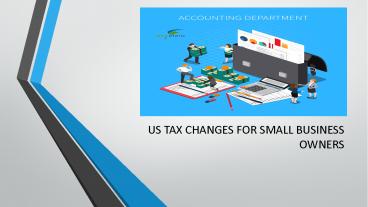US TAX CHANGES FOR SMALL BUSINESS OWNERS - PowerPoint PPT Presentation
Title:
US TAX CHANGES FOR SMALL BUSINESS OWNERS
Description:
The pandemic has affected nearly every small business posing a threat to their sustainability. The government brought many schemes to support these businesses. This document gives a top line overview of the tax deductions/credits and allowable expenses for these small businesses. – PowerPoint PPT presentation
Number of Views:7
Title: US TAX CHANGES FOR SMALL BUSINESS OWNERS
1
- US TAX CHANGES FOR SMALL BUSINESS OWNERS
2
US TAX CHANGES FOR SMALL BUSINESS OWNERS
- The pandemic has affected nearly every small
business posing a threat to their sustainability.
The government brought many schemes to support
these businesses. This document gives a top line
overview of the tax deductions/credits and
allowable expenses for these small businesses. - Section 162 of the Internal Revenue Code allows
businesses to deduct all ordinary and necessary
expenses paid or incurred during the taxable year
in carrying on a trade or business. Note that no
deduction is allowed for personal, family or
living expenses.
3
Tax deductions
- 20 pass-through tax deduction- If you function
as a Sole-Proprietorship, Partnership, LLC,
S-Corp then you are a pass-through entity,
meaning a legal entity where income "passes
through" to investors or owners that is, these
entities are not subject to corporate income tax
or any other entity level tax. These qualify for
an automatic 20 deduction from business taxable
income. For more details click on the link
https//www.irs.gov/newsroom/irs-highlights-tax-re
form-changes-that-affect-businesses
4
- Business Vehicles- If you are using a car for
business purposes then you can deduct, he entire
amount of the car up to certain limits. It must
be noted that only the expenses incurred for
business purposes can be deducted. This can be
claimed either by subtracting business miles or
by capitalizing the vehicle as an asset and
depreciating the portion of that cost each year.
5
- Business Travel- You can deduct 100 of expenses
concerning business travel, vacation, and
lodging. The travel should be solely for business
purposes. - Business meals- business meals are 100
deductible for tax years 2021 and 2022. This rule
was made for the hospitality industry so that
they can recover from the pandemic.
6
- Home-office deduction- this allows you to deduct
expenses concerning mortgage interest, property
taxes, insurance, utilities, WIFI repairs, and
also depreciation from taxable income. The
important point to note here is that you use a
part of your home for business. - Business Interest Expenses- If your business has
any debt then you can deduct the interest expense
associated with it. It must be noted that the
principal payment is not an expense therefore
this cannot be deducted. However, you can deduct
the entire amount that the bank earns from
issuing debt to you.
7
Tax changes
- Coronavirus Aid, Relief, and Economic Security
(CARES) Act- was set up in response to the
economic downturn as a result of the pandemic.
This Act came with the concept of the Paycheck
Protection Programme (PPP), which are forgivable
loans to small businesses. PPP is considered as a
forgivable loan till the time the money is being
utilized for payroll, rent/mortgage, and utility
payments. Any kind of fund which is received by
business as a way of PPP is not considered as
taxable.
8
- Economic Injury Disaster Loan (EIDL)- This
programme supports businesses that suffered a
temporary loss of revenue caused by the pandemic.
EIDL funds are typically not taxed at the federal
level. But it's important to monitor your state's
ruling on how it treats forgiven funds in terms
of both taxation and expense deductions. EIDL
loan is not forgivable. Borrowers do have to pay
back EIDL loans according to the SBAs (Small
Business Administration) repayment terms.
9
- Employee Retention Tax Credit (ERTC)- Eligible
employers can get immediate access to this credit
by reducing employment tax deposits they are
otherwise required to make. Also, if the
employer's employment tax deposits are not
sufficient to cover the credit, the employer may
get an advance payment from the IRS. This act
encourages businesses to keep employees on their
payroll. The refundable tax credit is 50 of up
to 10,000 in wages paid by an eligible employer
whose business has been financially impacted by
COVID-19.
10
Eligibility criteria
- Full or partial suspension of the business by the
government - significant decline in gross receipts i.e., more
than 50 drop in the gross receipts for any given
quarter when compared with the same quarter in
2019.
11
- Families First Coronavirus Response Act (FFCRA)-
this programme provides small and midsize
employers refundable tax credits that reimburse
them for the cost of providing paid sick and
family leave wages to their employees for leave
related to COVID-19. Businesses that provided
paid leave falling under this category can claim
100 tax credits.
12
About US
- Visit Our Website http//accelero-corp.com/
- Contact Us info_at_accelero-corp.com































